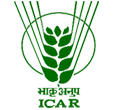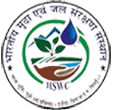ICAR-IISWC, Dehradun facilitated the distribution of high-quality foundation seeds of wheat at Raipur Block under the Farmers FIRST project on October 29, 2024
The ICAR-Indian Institute of Soil and Water Conservation (ICAR-IISWC) facilitated the distribution of high-quality foundation seeds of wheat varieties suitable for both irrigated and rainfed conditions in Uttarakhand on 29.10.2024. This initiative was organized at Raipur Block of Dehradun under the Farmers FIRST project of ICAR, executed at ICAR-IISWC, Dehradun.
Dr Bankey Bihari, Principal Scientist and Project PI, briefed the farmers on the genetic potential, high yield, and regional suitability of the wheat varieties. He highlighted that the varieties have the capacity to yield 60-70 quintals per hectare (Q/ha) in the plains and 35-45 Q/ha in the Dehradun region, where soil and farming conditions pose certain constraints. Despite these challenges, the yield far exceeds the 15-18 Q/ha typical of traditional or locally used varieties.
Dr M. Muruganandam, Principal Scientist and Head (PME & KM Unit), emphasized the importance of quality inputs and seeds for sustainable farming. He noted that distributing the seeds on Dhanteras, a festival symbolizing prosperity, would bring good fortune to the farmers, who in turn contribute to societal well-being. He added that this participatory effort uses farmers' fields as both seed production hubs and experimental grounds, fostering mutual benefits for the community and the institute. Farmers were urged to sow the seeds promptly to achieve optimal results.
Seed distribution and buy-back arrangement was enshrined in the intervention through appropriate MoU with farming communities. Two wheat varieties were distributed, Unnath-PBW 343 for irrigated fields and VL 967 for rainfed conditions.
The seeds were provided through a buy-back arrangement with the Uttarakhand Seeds and Tarai Development Corporation Ltd (UKS&TDC), Dehradun. Each farmer received 20-40 kg of seeds, with a total of 21 quintals distributed among 90 farmer-beneficiaries. In this model, farmers will return at least twice the quantity of seeds they receive at the current market rate to be processed as certified seeds by UKS&TDC, while the remaining seeds can be used at their discretion.
The varieties distributed are new to the region and offer improved yields of up to 50 Q/ha. They also feature an extended sowing window from November 15 to 25, easing the pressure on irrigation and minimizing water competition within the community.
Over the past three years, four other wheat varieties—DBW 222, DBW 303, DBW 187, and VL 953-were introduced under the same project. These varieties have been well-received, providing excellent yields and becoming self-propagating through successive sowing cycles.
Farmers expressed appreciation for the performance of the distributed seeds, noting that they have successfully used them for resowing, contributing to sustainable agricultural practices and improved productivity. Sh Kushal Pal Singh, Farmers Produce Organization, Kotimachak and other project staff of the Institute were also present during the program.



